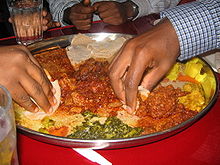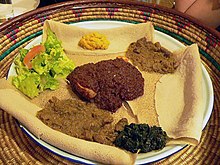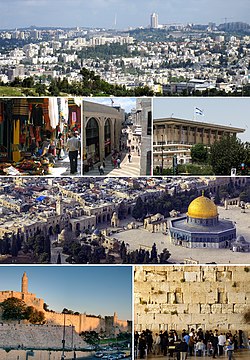The Christmas celebration is enjoyed
differently in various places. For
instance, in;
Nigeria
Christmas Day is a public holiday in Nigeria which is marked by the emptying of towns and cities as Nigerians return to their ancestral villages to be with family. As the towns and cities empty, people jam the West African markets to buy and transport live chickens, goats and cows that will be needed for the Christmas meals. Some of the common meals enjoyed during the celebration include: Rice, ponded yam, fufu, tuwo, amale etc.
Fufu served with peanut soup.
Ethiopia
Christmas is on January 7th. It is usually a public holiday in Ethiopia, and on the night of Christmas Eve (Christmas Eve is on January 6), Christian priests carry a procession through town carrying umbrellas with fancy decorations. (Christmas is called Ganna in Ethiopia) Then the procession finally ends at local churches where Christmas mass is held. Then on Christmas morning, the people open presents and then they play outdoor sports (that are native to Africa) to celebrate. Usually the wealthy shares a medium sized feast with the poor and a large feast with their family and friends. Dishes include: Dora wat, Injera.


Dora wat injera and several kinds of wat or tsebhi (stew), is typical of
Israel and the Palestinian territories
Israel is a Jewish state; thus, Jewish Israelis do not celebrate Christmas. The celebration of Hanukkah falls at approximately the same time, but it has not undergone the same osmosis of Christmas-like practices (such as exchange of gifts) that the holiday has in the United States and Europe. Most Israeli Arabs are Muslim, and thus do not celebrate Christmas either, but there is a minority of Christian Israeli Arabs who do celebrate Christmas. Given the diversity of denominations among Christian Israeli Arabs, some celebrate with the Western Churches on the Gregorian 25 December, and others with the Eastern Churches on the Gregorian 7 January (Julian 25 December).
The pattern of Christmas observance among the Palestinians residing in the West Bank and Gaza Strip in the Palestinian territories is similar to that of Israeli Arabs across the Green Line.
Although Christianity is a minority in Israel, Christmas is important in both areas due to the region's significance as the place where Jesus lived, and as a destination for Christian pilgrims around the world, especially during Christmas time. Bethlehem, where Jesus was born, lies in the West Bank, with the Church of the Nativity being a prominent symbol of the city for both Christian and Muslim Palestinians as well as a site of pilgrimage for thousands annually. Nazareth, Jesus' hometown and another pilgrimage site, is a mixed Jewish/Israeli Arab city lying in northern Israel. Finally, Jerusalemcontains the Church of the Holy Sepulchre; although it is overall the largest centre of Christian pilgrimage, its associations with the Crucifixion and Resurrection of Jesus tend to focus pilgrimage towards Eastertide rather than Christmas. Christian pilgrimage makes up a significant proportion of the Palestinian economy in the West Bank, and accounts for a substantial proportion of tourism in Israel.

This silver star, beneath the altar in the Grotto of the Nativity, marks the spot believed to be the Birthplace of Jesus.


Japan
Encouraged by commerce, the secular celebration of Christmas is popular in Japan, though Christmas is not a national holiday. Gifts are sometimes exchanged.[14] Christmas parties are held around Christmas Day; Japanese Christmas cake is often a white sponge cake covered with cream and decorated with strawberries. Christmas lights decorate cities, and Christmas trees adorn living areas and malls.[14] Christmas Eve has become a holiday for couples to spend time together[14] and exchange gifts.
The first recorded Christmas in Japan was a Mass held by Jesuit missionaries in Yamaguchi Prefecture in 1552. Some believe that unrecorded celebrations were held before this date, starting in 1549 when Saint Francis Xavier arrived in Japan. Christianity was banned throughout Japan in 1612. However, a small enclave of Kakure Kirishitan ("hidden Christians") continued to practice underground over the next 250 years.
Christianity in Japan along with Christmas reemerged in the Meiji period. Influenced by America, Christmas parties were held and presents were exchanged. The practice slowly spread, but its proximity to the New Year's celebrations makes it a smaller focus of attention. During World War II, all celebrations, especially American, were suppressed. From the 1960s, with an expanding economy, and influenced by American TV, Christmas became popular. Many songs and TV series present Christmas as romantic, for example "Last Christmas" by Exile.
The birthday of the current emperor, Akihito, on December 23 is a national holiday. Businesses soon close for the New Year's holidays, reopening after January 3.




No comments:
Post a Comment